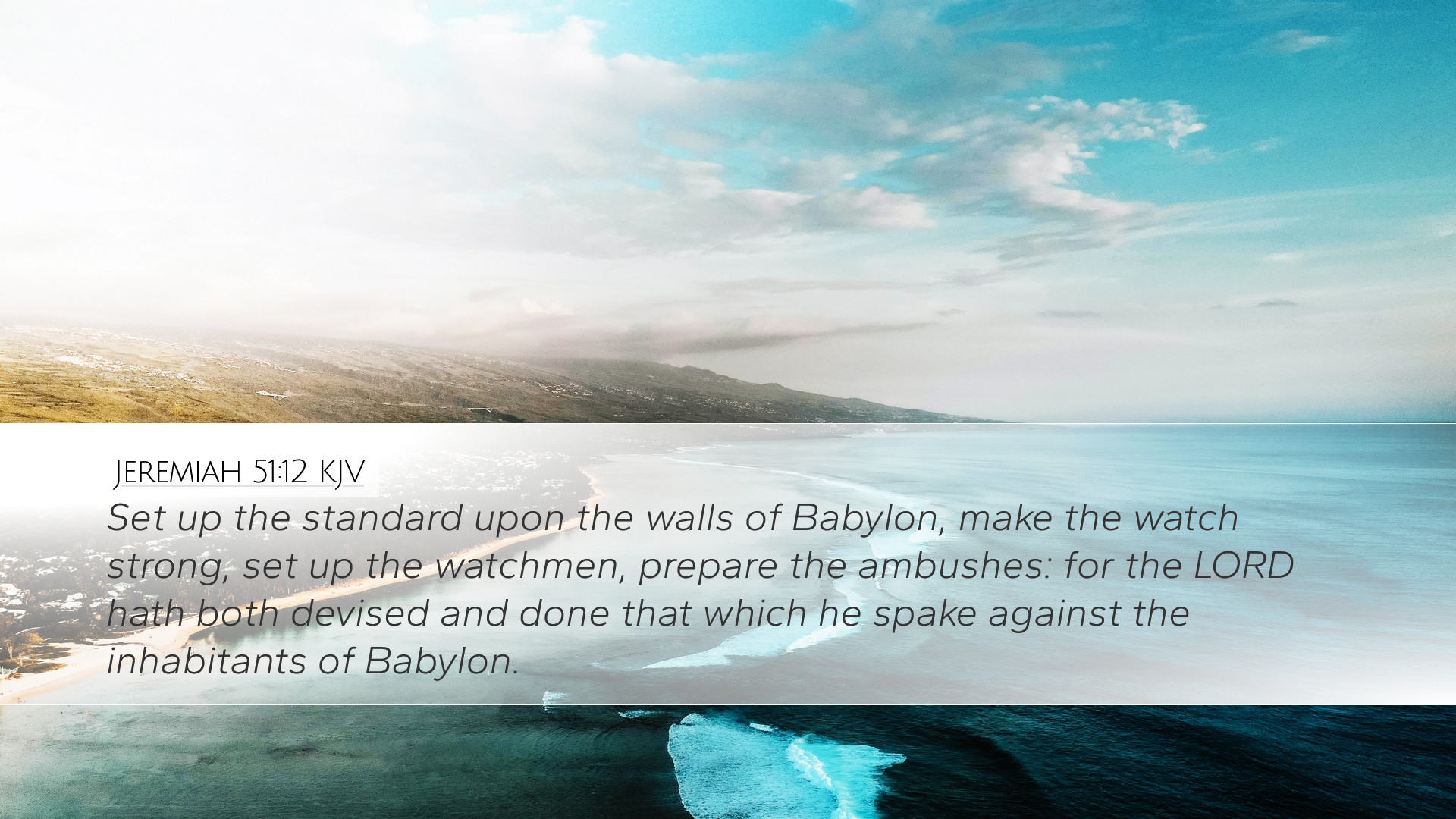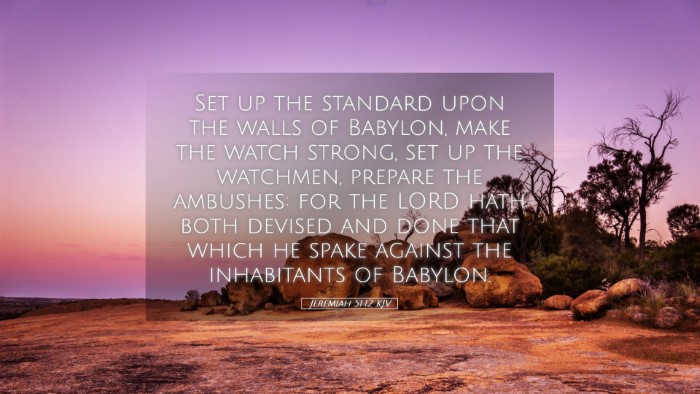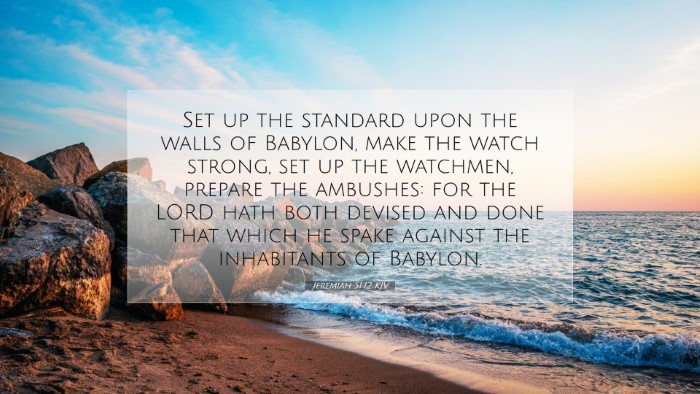Old Testament
Genesis Exodus Leviticus Numbers Deuteronomy Joshua Judges Ruth 1 Samuel 2 Samuel 1 Kings 2 Kings 1 Chronicles 2 Chronicles Ezra Nehemiah Esther Job Psalms Proverbs Ecclesiastes Song of Solomon Isaiah Jeremiah Lamentations Ezekiel Daniel Hosea Joel Amos Obadiah Jonah Micah Nahum Habakkuk Zephaniah Haggai Zechariah MalachiChapter
Jeremiah 1 Jeremiah 2 Jeremiah 3 Jeremiah 4 Jeremiah 5 Jeremiah 6 Jeremiah 7 Jeremiah 8 Jeremiah 9 Jeremiah 10 Jeremiah 11 Jeremiah 12 Jeremiah 13 Jeremiah 14 Jeremiah 15 Jeremiah 16 Jeremiah 17 Jeremiah 18 Jeremiah 19 Jeremiah 20 Jeremiah 21 Jeremiah 22 Jeremiah 23 Jeremiah 24 Jeremiah 25 Jeremiah 26 Jeremiah 27 Jeremiah 28 Jeremiah 29 Jeremiah 30 Jeremiah 31 Jeremiah 32 Jeremiah 33 Jeremiah 34 Jeremiah 35 Jeremiah 36 Jeremiah 37 Jeremiah 38 Jeremiah 39 Jeremiah 40 Jeremiah 41 Jeremiah 42 Jeremiah 43 Jeremiah 44 Jeremiah 45 Jeremiah 46 Jeremiah 47 Jeremiah 48 Jeremiah 49 Jeremiah 50 Jeremiah 51 Jeremiah 52Verse
Jeremiah 51:1 Jeremiah 51:2 Jeremiah 51:3 Jeremiah 51:4 Jeremiah 51:5 Jeremiah 51:6 Jeremiah 51:7 Jeremiah 51:8 Jeremiah 51:9 Jeremiah 51:10 Jeremiah 51:11 Jeremiah 51:12 Jeremiah 51:13 Jeremiah 51:14 Jeremiah 51:15 Jeremiah 51:16 Jeremiah 51:17 Jeremiah 51:18 Jeremiah 51:19 Jeremiah 51:20 Jeremiah 51:21 Jeremiah 51:22 Jeremiah 51:23 Jeremiah 51:24 Jeremiah 51:25 Jeremiah 51:26 Jeremiah 51:27 Jeremiah 51:28 Jeremiah 51:29 Jeremiah 51:30 Jeremiah 51:31 Jeremiah 51:32 Jeremiah 51:33 Jeremiah 51:34 Jeremiah 51:35 Jeremiah 51:36 Jeremiah 51:37 Jeremiah 51:38 Jeremiah 51:39 Jeremiah 51:40 Jeremiah 51:41 Jeremiah 51:42 Jeremiah 51:43 Jeremiah 51:44 Jeremiah 51:45 Jeremiah 51:46 Jeremiah 51:47 Jeremiah 51:48 Jeremiah 51:49 Jeremiah 51:50 Jeremiah 51:51 Jeremiah 51:52 Jeremiah 51:53 Jeremiah 51:54 Jeremiah 51:55 Jeremiah 51:56 Jeremiah 51:57 Jeremiah 51:58 Jeremiah 51:59 Jeremiah 51:60 Jeremiah 51:61 Jeremiah 51:62 Jeremiah 51:63 Jeremiah 51:64


Commentary on Jeremiah 51:12
The verse Jeremiah 51:12 states: "Set up the standard upon the walls of Babylon, make the watch strong, set up the watchmen, prepare the ambushes: for the Lord hath both devised and done that which he spake against the inhabitants of Babylon."
Contextual Overview
In the context of Jeremiah 51, the prophet is delivering God’s prophecy concerning the impending destruction of Babylon. This chapter is often viewed as one of judgment against a nation that has oppressed Israel and contributed to their suffering. Babylon serves as a symbol of human pride and antagonism against God, exemplifying the consequences of turning away from divine principles.
Verse Breakdown
Jeremiah 51:12 can be broken down into several key components to facilitate a deeper understanding:
Theological Insights
This passage reveals several significant theological themes that are of paramount importance for understanding God’s character and His dealings with nations:
Commentary Insights
Drawing upon insights from Matthew Henry, Albert Barnes, and Adam Clarke, we see various dimensions explored:
Matthew Henry
Matthew Henry emphasizes the call to prepare for battle, noting that God's command to raise the standard signifies both a warning to Babylon and a rallying cry for Israel. He points out that God’s plan involves the use of human agency and diligence in preparation for divine judgment.
Albert Barnes
Albert Barnes places emphasis on the nature of divine orchestration in historical events. He comments on the significance of the "watchmen," suggesting that it represents the prophetic voice that urges the people to stay alert and recognize divine movements. Barnes also discusses the precision of God’s strategy against Babylon and reiterates the certainty of His decrees.
Adam Clarke
Adam Clarke provides a detailed look at the historical implications of this verse. He speaks to the importance of the Babylonian Empire's imminent fall, suggesting it as a demonstration of God’s ultimate authority over nations. Clarke highlights that the prophecy serves both as a warning and an assurance of God’s control over every situation, boldly declaring that the plans of humans are rendered futile against divine intentions.
Application for Today
As pastors, theologians, and students of the Bible reflect on Jeremiah 51:12, it becomes imperative to consider the implications of this scripture in contemporary settings: